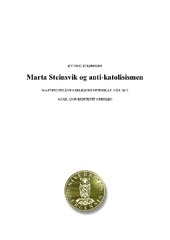Marta Steinsvik og anti-katolisismen
Master thesis
Permanent lenke
https://hdl.handle.net/1956/10032Utgivelsesdato
2015-05-13Metadata
Vis full innførselSammendrag
Gjennom føredrag og gjennom Steinsvik-Riesterer-saka, ei rettssak som fekk stor merksemd, vart Marta Steinsvik ein nøkkelfigur innan norsk anti-katolisisme på 1920-talet. Denne studia kontekstualiserer hennar anti-katolske hovudverk, Sankt Peters himmelnøkler, og ser på debattar rundt katolisismen i Noreg på 1920-talet, samt på kva kjelder som inspirerte Steinsvik, inkludert britisk viktoriansk anti-katolisisme, amerikansk 1800-tals-nativisme og tekstar frå den tyske kulturkampen. Vidare vert det sett søkelys på debattane rundt jesuittparagrafen på 1920- og 1950-talet, og i eit avsluttande kapittel vert det sett nærare på anti-jesuittiske idear innan moderne norsk konspirasjonskultur, og på korleis Steinsvik vert lese inn i denne samanhangen. Through lectures and a highly publicized trial, the former anthroposopher Marta Steinsvik became a key figure in Norwegian anti-Catholicism in 1920s. This study contextualises her main anti-Catholic work, Sankt Peters himmelnøkler (St. Peter's Keys to Heaven), looking at the debates on the Catholic church in Norway throughout the 1920s, as well as on the intertextual relationship between Steinsvik's writings and earlier anti-Catholic works, primarily works produced in Victorian England, by nativist American writers in the 19th century and by German writers involved in the Kulturkampf. The study shows how Steinsvik conveyed internationally well-known anti-Catholic propaganda, stereotypes and conspiracy theories to a Norwegian audience. Furthermore, the study explores the debates surrounding the Norwegian constitutionary ban against the Jesuit order, a ban which was upheld by parliament in 1925, and which remained part of the Norwegian constitution until 1956. A final chapter looks at modern-day Norwegian anti-Jesuitism and conspiracy culture, and at the use of Steinsvik's writings within this framework.
